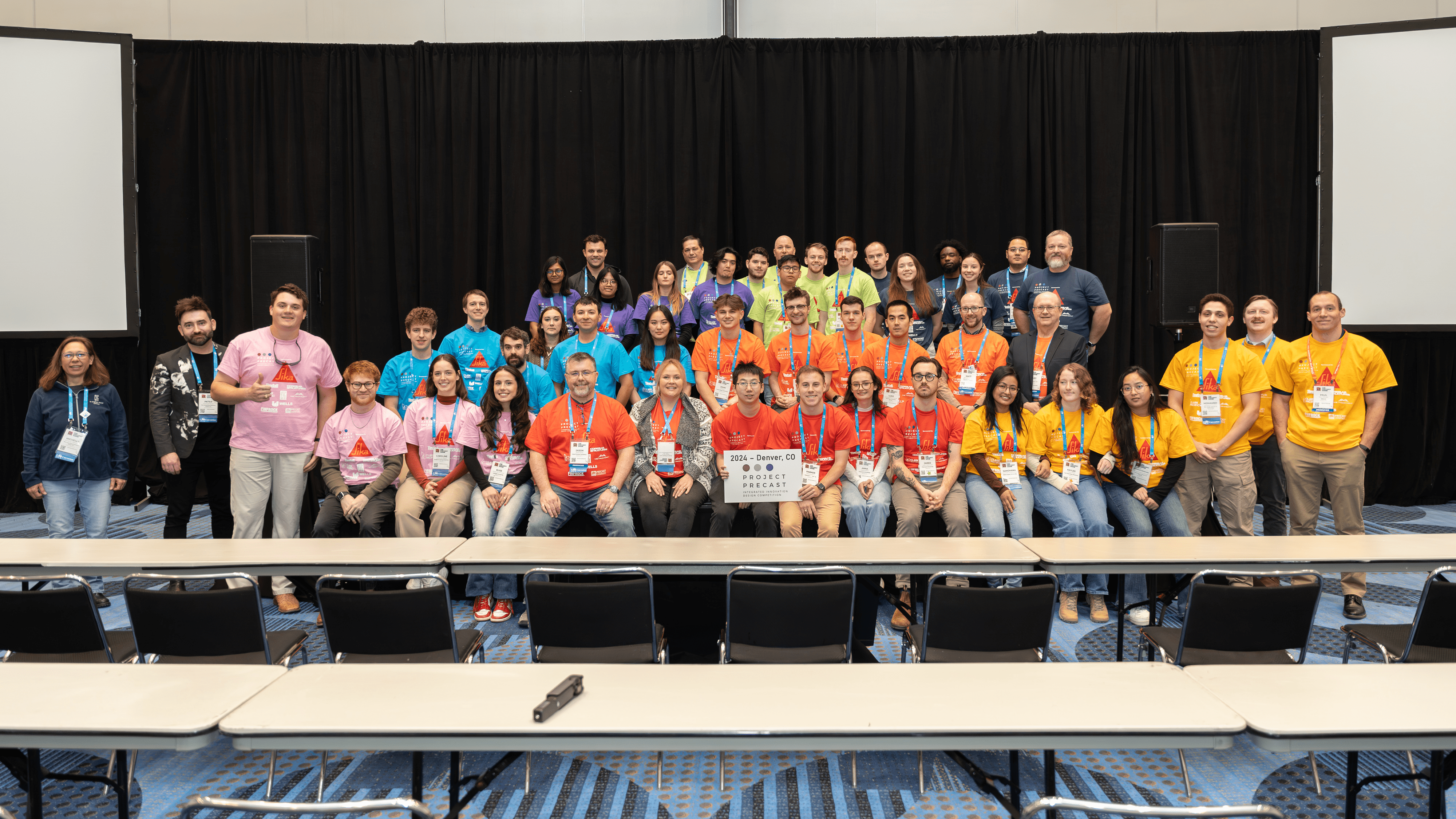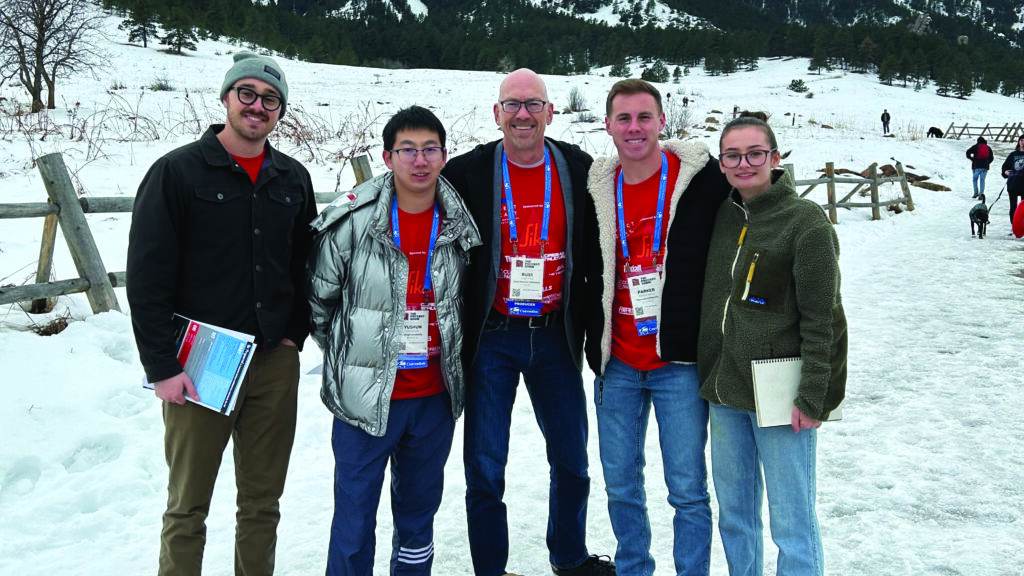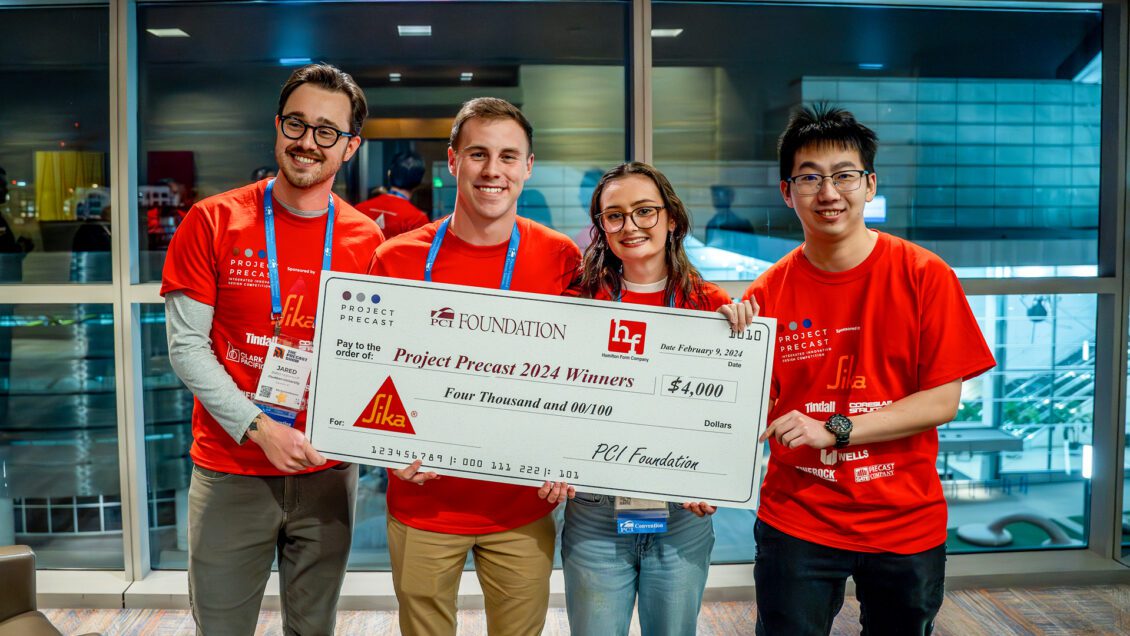Students from Clemson’s School of Architecture and the Glenn Department of Civil Engineering program won the Precast Concrete Institute (PCI) Foundation’s 6th Annual Project Precast Design Competition.
According to the PCI Foundation, the competition, held during the annual PCI Convention, is meant to introduce students to the many uses of precast and prestressed concrete and showcase the precast industry’s availability of design assistance. Students also explored the convention’s show floor, had the opportunity to call upon experts for help, scope out many of the accessories used in precast concrete design and were paired with a precast sponsor.
Anna Durfee, an undergraduate architecture student; Jared Fasshauer, a graduate architecture student; and Parker Welsh, an undergraduate civil engineering student, joined forces with Yoshon Zou, a student from Lehigh University, to compete in the grueling competition.

Students from 17 universities from across the United States met in Denver and were randomly assigned into groups of four for this year’s competition. According to the PCI Foundation, the teams only had 48 hours to completely design a structure that was indicative of the host city. The teams then presented their designs to over 225 attendees. During the 2024 competition, teams were tasked with designing a Museum of Mountain Sports that would be located in Boulder, Colorado. As the winners of the Precast Project, the students each took home $1,000.
Broadening educational opportunities
Named “Team Gate,” during the competition, this was the students’ first time applying and competing in the project.

Durfee, inspired after learning about the competition from a friend in the Civil Engineering department at Clemson, felt that the competition was an excellent opportunity to work with students in engineering and construction management disciplines.
“As an architecture student, I’m used to a collaborative design process surrounded by other designers,” Durfee said. “I saw Project Precast as a great opportunity to gain insight into the engineering and construction management side of things. “
Welsh applied because the company he works for is a precast engineering firm.
“As a senior civil engineering major, with an emphasis in structural engineering, I was already familiar with the industry,” explained Welsh. “I knew it was something I had a chance of winning.”
After taking a studio in the Fall semester that had an emphasis on precast concrete, Fasshauer’s professor encouraged him to apply to the competition.
The ticking clock
According to the students, creating a completely designed structure in only 48 hours is a challenging task.
“It was very stressful and exhausting but also extremely rewarding in the end,” explained Welsh. “We stayed up late both nights, including only getting about 4 hours of sleep the night before the presentation.”
“It was definitely a challenge, but I think that only having 48 hours to complete and present the project worked in our favor,” Fasshauer added. “It made us take an idea and run with it rather than overthinking.”
Durfee noted that she had never designed anything of that scope in such a short period.
“Honestly, it was about as stressful as it sounds,” she said. “I’m used to having an entire semester to complete a project like this, and I had never designed anything this fast before.”
Designing as a team
While they all came from different educational and personal backgrounds, the group felt that their differences directly informed their designs in a positive manner.
“Combining our different experiences and various backgrounds allowed us to all bring different skills to the table,” Durfee shared.
Welsh acted as the team’s lead structural engineer during the competition.
“It was my job to make sure that as the architects designed, it was still able to be constructed,” said Welsh. “Being familiar with precast buildings, I acted as their guide for what is possible with precast panels. I tried not to limit their creativity, but rather redirect their creative ideas into something that is practical.”
“I think we got lucky that our skills meshed so well together,” Fasshauer said.
Inspired by the landscape
The team’s project included a water gallery, rock gallery, air gallery, dirt gallery, snow gallery and exhibition gallery.
“For our particular design, we were inspired by the diverse environments and natural features of our site in Chautauqua Park, Boulder, Colorado, Durfee said. “We took inspiration from the geometry of the mountain range visible from the site, as well as the shapes of rivers and trees near the site.”
Durfee went on to explain that the team wanted to incorporate different textures and forms of precast concrete in their design, which they did using decorative precast facades, columns and walls throughout the museum.






For Fasshauer, the competition will directly impact his professional career.
“I’m graduating in May, so for my professional work, I definitely see myself emphasizing precast concrete,” he said. “I have a good grasp of it as a building material now and see its immense potential.”
Welsh echoed Fasshauer’s feelings. “Being a part of the precast industry already, this competition has greatly impacted my list of accomplishments,” he said.
For Durfee, the opportunity to work with students from other backgrounds was insightful, as it allowed her to get a taste of working in the field of architecture professionally.
Get in touch and we will connect you with the author or another expert.
Or email us at news@clemson.edu

